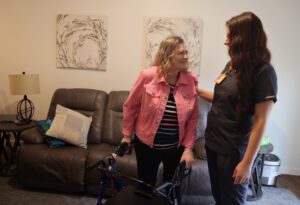Private Duty Caregivers Help Your Loved One and Offer Support For You, Too
Alzheimer’s and dementia are challenging for the person experiencing these diseases, and they are equally hard for family members and friends. It’s hard to watch your loved one change and lose some of the qualities that you’ve always cherished in them. Some family members say that it’s as if you are grieving the loss of the person before they’re even gone.
As people with Alzheimer’s or dementia begin to experience health declines, they often have trouble with tasks they used to handle on their own. Eventually, you may find that you become a full-time caregiver for your loved one. The difficulties of being a caregiver present new hardships, even though you want to do everything you can to be helpful and loving.
But there is hope and help you can rely on as you and your loved one struggle with the challenges of Alzheimer’s or dementia: private duty caregivers.
Help When You Need It
Depending on the private duty care provider you choose, caregivers assist your loved one on a schedule you create, so you can take care of your own responsibilities or go to work without worrying about your loved one’s safety. During these shifts, caregivers can provide:
- Help with day-to-day tasks.
- Routine and structure.
- Companionship.
- Transportation for social outings.
- Respite care for family members.
- And more.
Why Help With Day-to-Day Tasks Is Important For Alzheimer’s and Dementia Care
Private duty care can support your loved one’s independence where necessary and as their disease progresses.
Independence enhances quality of life for people with Alzheimer’s or dementia. Some researchers have found that engaging in mentally and physically stimulating activities, whether independently or even with significant support, may slow the progression of dementia.
A private duty caregiver’s primary goal is to help improve your loved one’s quality of life, while creating a safe and healthy environment for them at home. The tasks that private duty caregivers perform include:
- Basic housekeeping.
- Meal planning.
- Cooking.
- Grooming.
- Personal hygiene, such as bathing and dressing.
- Pet care.
- Medication reminders.
- Help with other tasks of daily living.
Because Alzheimer’s and dementia are progressive, you may find that the tasks that a private duty caregiver takes on will change as your loved one experiences more symptoms.
In the earlier stages of dementia, for example, your loved one may only need reminders about tasks or help with safety concerns while getting around the house. In later stages of their disease, a private duty caregiver may offer more comprehensive help.
Routine and Structure During Alzheimer’s and Dementia Care
One of the most important approaches to caring for a person with dementia or Alzheimer’s is developing structure and routine. The Alzheimer’s Association recommends creating a daily care plan, even for people who are still fully independent.
A daily care plan:
- Maps out a list of activities that are safe and manageable.
- Focuses on activities that bring your loved one enjoyment.
- Gives your loved one something to look forward to.
- Stimulates your loved one’s memory and cognition.
- Maximizes the times of day when your loved one has energy.
- Helps establish a routine for sleeping and waking for those who struggle with sleep or sundowning (a change in behavior in the late afternoon or evening).
A private duty caregiver can follow this plan when they care for your loved one. As your loved one experiences more symptoms, your private duty caregiver can adapt to follow a new care plan.
The Power Of Companionship, Activities, and Social Gatherings
Private duty caregiving isn’t just about having a helper around for chores and daily tasks. Private duty caregivers build meaningful relationships with those they care for. Research also shows that people with Alzheimer’s or dementia benefit from socializing, conversation, personal connection, and physical activity.
Your loved one and a private duty caregiver can engage in activities that simulate mental cognition, such as puzzles and other doctor-recommended pastimes.
A private duty caregiver can also provide transportation for day programs, exercise programs that are beneficial to people with dementia, or a walk in nature. Caregivers also can take your loved one to doctor’s appointments, making it easier for family caregivers who may not be available.
When your loved one has a dedicated caregiver, they can continue to experience the best quality of life, even as their disease progresses.
Respite Care For Family Caregivers Of Loved Ones With Alzheimer’s or Dementia
Another critical service of private duty care is respite care. If you are a family caregiver who is responsible for your loved one’s Alzheimer’s or dementia care, you may feel overwhelmed.
Although you may feel responsible for your loved one’s care and want to do everything you can, it is completely normal to experience exhaustion, frustration, and stress, which can be difficult for both you and your loved one.
Respite care gives you a break to relax, focus on yourself, attend to other responsibilities, or even return to work. As a caregiver, you have to take care of yourself, or you’ll struggle to effectively take care of your loved one.
Private duty care is a compassionate solution that not only helps your family member with Alzheimer’s or dementia, but also provides care that the whole family deserves.






